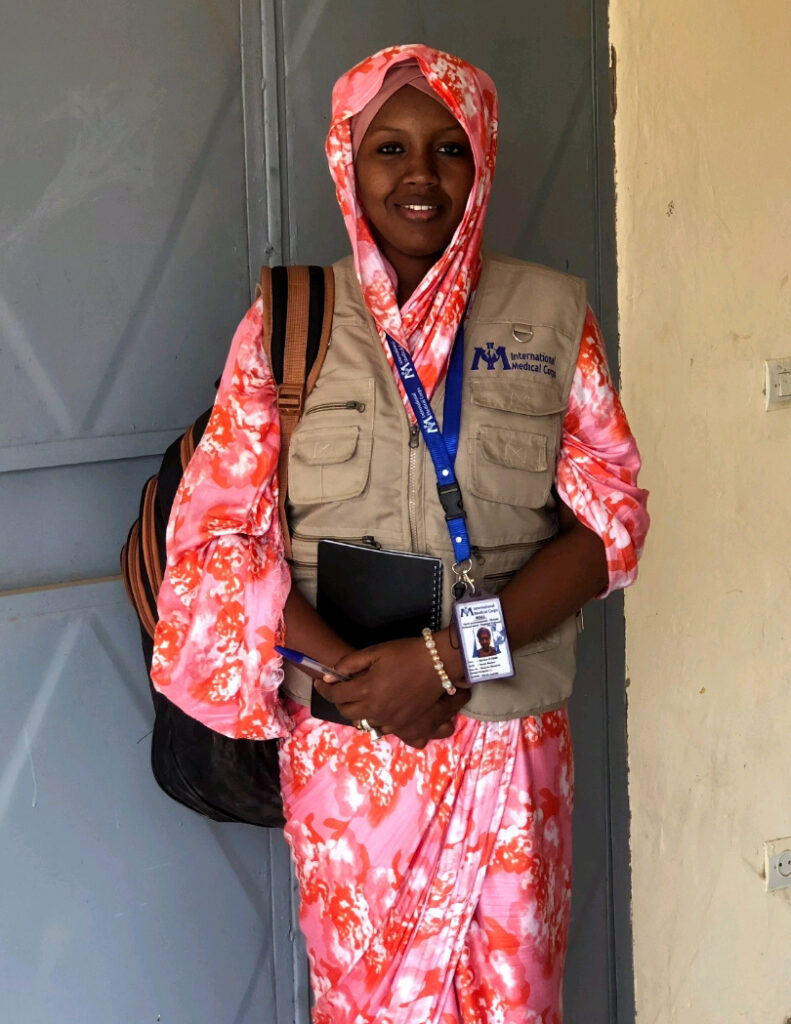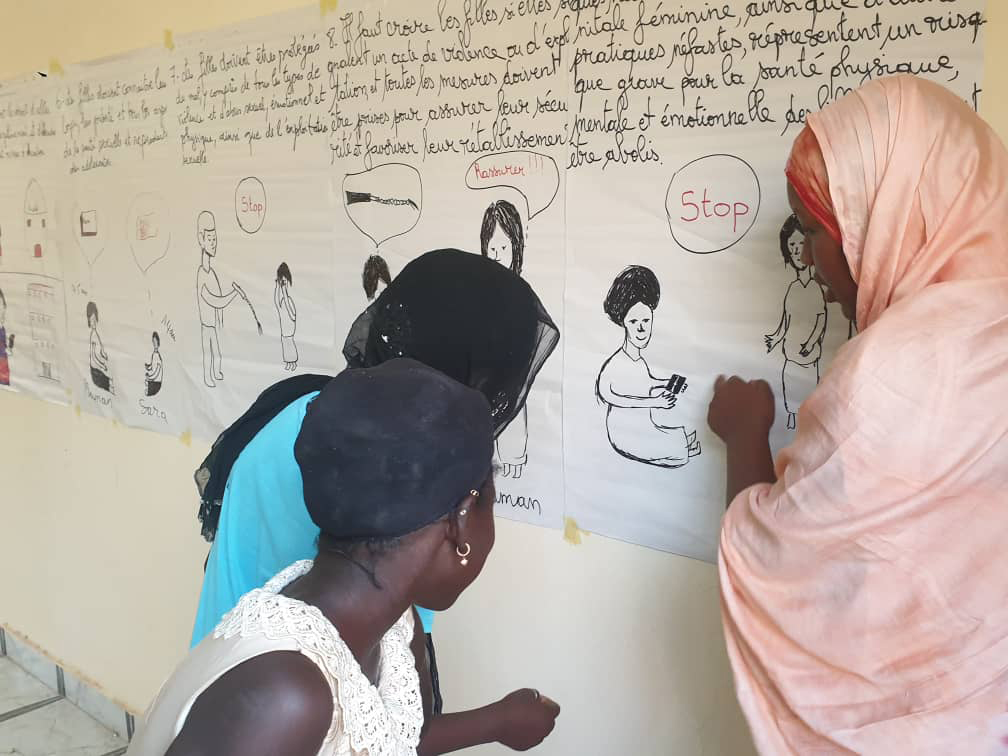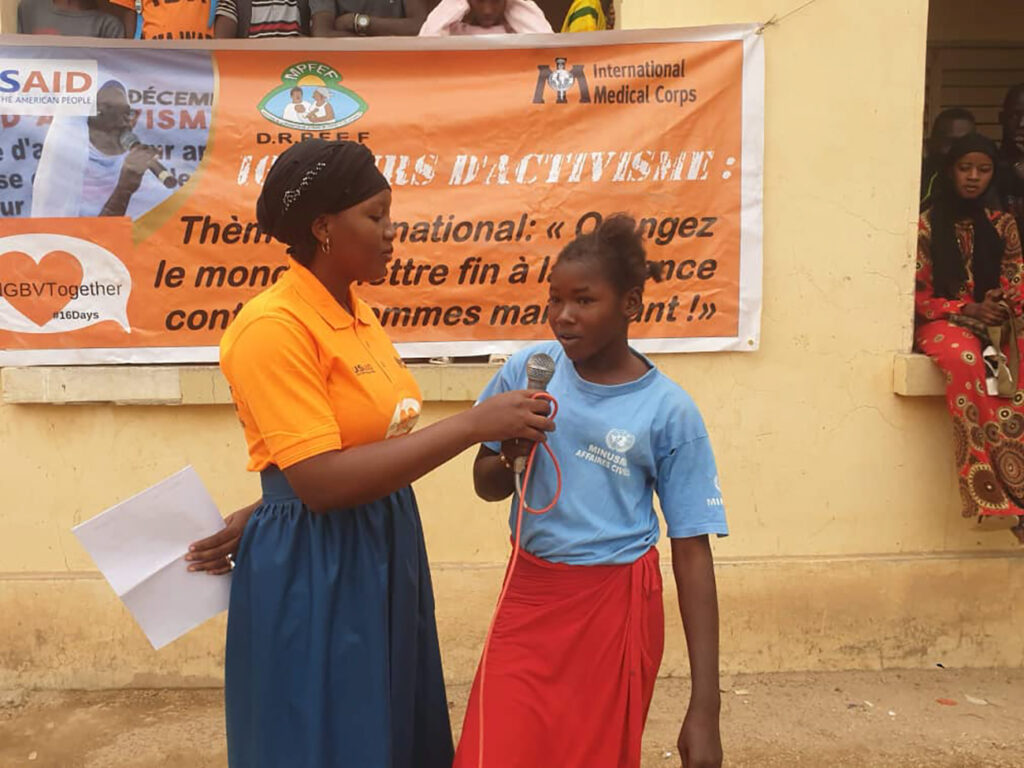In Mali, gender inequality and gender-based violence (GBV) are entrenched in the culture. International Medical Corps, with funding from USAID, is implementing an integrated GBV response and prevention project that increases access to services for survivors. The project reinforces structural and service-provider capacity while working with communities to reduce the stigma that survivors face, while combatting stereotyping and cultural norms that reinforce gender inequality. We are implementing the program through collaboration with state institutions and with the help of our dedicated staff—like Mariam Oumar Cisse, a 24-year-old social worker in Gourma-Rharous.
Mariam was born and raised in Diré, in the Timbuktu region of northern Mali. Harmful traditions such as female genital mutilation and forced marriages were pervasive realities in Mariam’s childhood community, in addition to high dropout rates among girls. Fortunately, Mariam’s parents encouraged her studies. With their support, Mariam dreamed of one day working toward gender equality and becoming a source of inspiration for generations of women and girls. She wanted to be a leader—inspiring and independent.
At the onset of the 2012 coup and subsequent humanitarian crisis in Mali, as the Timbuktu region turned volatile, Mariam’s parents sent her to the relatively stable capital city of Bamako. There, Mariam studied and escaped the violent conflicts among armed groups that were establishing Sharia law and spreading terror. In 2016, Mariam obtained her bachelor’s degree and continued her higher education at the National Institute of Training for Social Workers (INFTS) where she obtained her professional license in Social Protection.
When Mariam returned home in 2020, she was an example to the teenagers and parents in her community, though she received some derisive looks from some community members—at 24, Mariam was comparatively old for an unmarried woman. Nevertheless, her journey demonstrated that a girl can pursue an education and later marry the person of her choice.

Mariam was active socially and participated in women’s associations that advocate for gender equality. In February 2021, Mariam volunteered at the women’s and girls’ safe space that International Medical Corps operated in Diré. These safe spaces provide women and girls with an environment where they can develop life skills (sewing, embroidery, etc.), bond, enjoy recreational activities with other community members and share their experiences with confidentiality. For many, safe spaces are a place to receive information about GBV, its causes and consequences, as well as learn about available support services for survivors. “Before I first visited the safe space, I wondered what the women and girls were doing there,” Mariam says. “After participating in its activities, I began to understand the extent of the GBV problem and its impact on the survivor and community. I had to get more involved in the fight against inequality.”
Mariam soon established herself as a mentor and began implementing “Girl Shine” programming. Girl Shine is a program model developed by the International Rescue Committee to support, protect and empower adolescent girls living in humanitarian contexts. As a mentor, Mariam served as a role model, encouraging the potential and power that adolescent girls already possess and enabling them to build coping and self-management skills. She also helped the girls identify the types of GBV and provided information on how to seek support services so that they would be safer from GBV and better able to recover from GBV experiences. Girls Shine mentors—who typically are slightly older community members with whom the girls in the program can still identify—conduct weekly life-skills sessions on self-confidence, social and emotional skills, health hygiene, safety, solidarity vision, etc. They also facilitate monthly discussion sessions with parents, community members, religious leaders, etc., enabling girls and adolescents to share their challenges, make recommendations and advocate for change.

During this time, Mariam mentored a 16-year-old girl who had psychomotor delays, which made self-expression difficult. The girl’s peers teased her, but her interest in the sessions persisted. Mariam found the 16-year-old’s resolve moving. “My role was to help her find her place into the group,” she says.
“As the sessions continued, this girl’s confidence grew. She openly spoke in front of the other girls and shared her opinions more often despite the time it took to express her thoughts. She found refuge in my company, which gave me confidence as well. Today she has developed self-determination and the others recognize that she has something to contribute. She is a friend that other classmates care about. Thanks to her, the girls have gained knowledge and courage to express themselves in public in different forums. None of it would have happened without this program or without her.”
In March 2021, Mariam participated in a recruitment process and secured a social worker position with International Medical Corps, which Mariam found particularly meaningful since International Medical Corps’ safe space in Diré is where her journey as a volunteer began. Mariam now supervises a Girls Shine program and manages GBV cases with four other psychosocial agents (see graph and table). More than just managing cases, Mariam and her team support women as they take on the enormous task of rebuilding their lives. In the process, they support entire communities as they contribute to women’s rights and gender equality.
